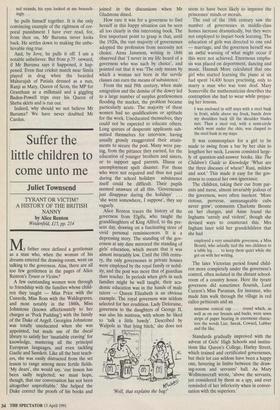Extra coverage without being caught out
J.L. Carr
PLAYING THE GAME by Ian Buruma Cape, f13.99, pp.234 Colonel Sir Shri Ranjitsinhji, Jam Saheb of Nawanagar, Prince of the (Mysterious) East, English folk-hero with diamond tie-pity in I. Zingari tie, a pocket- ful of Cartier gold eggs and, under his belt, 3000 runs, (ay.87) and a salute of five dou- ble-centuries in the Indian-summer of '99. Not Sir Walter Scott, not even Sir Bulwer Lytton opened a novel with more lustrous a hero. Why, even my father had heard of him.
And Mr Buruma's narrator, spotting that he is onto a winner, hurries off to develop this splendid theme.
He crosses an ocean, a sub-continent, a desert, to a bedroom in a decaying palace, notes its rack of fossilising cricket bats, the empty parrot cage, half-a-dozen glass eyes, a heavily framed oil-painting of bathing boys by Sir Edward Tuke, R.A. . . and an odd smell. (The truth? Decaying already?) An attendant whispers; an envelope changes hands. And out tumbles a wad of paper tied with a Cambridge blue silk rib- bon. They are those lost letters from Ranji to his god Charlo, C (Charles) B (Burgess) Fry (3000 run, ay.75, and six successive cen- turies in the Sussex summer of '01.) The bundle fills in biographical details which even Neville Cardus would have been exer- cised to conjure up.
The novel's epigraph should have been let me not to the marriage of true minds admit impediment'. But the interior quote from Ramchandri Gandhi would have been just as apt — 'A batsman only has one life. But there is the possibility of a reincarna- tion in a second innings.' Perhaps that would have been more apt: after all, I take this novel to be Ranji's second innings.
Lately there has been a revival of resur- rectionary fiction. And, as William Shakespeare understood, a fictive recon- struction has much to be said for it. For its author can rely upon his inadequacies being not just repaired but improved by an audience reading between his lines what should have been there and is not. (A play- goer or reader who recalls veni, vidi, vici is the more likely to be affected by a despair- ing Et tu, Brute). There are drawbacks, of course. For instance, it would not do to trundle centre- stage too well-documented a person such as the Duke of Wellington (who wrote 700 known letters to Mrs Arbuthnot) or one of the sleeping partners in the Bloomsbury Industry. Nor would Margaret Thatcher be a sure-fire choice: too lifelike a waxwork is likely to affront a beholder's fixed opinions and, anyway, she might sue. Neither would it be wise to attempt anyone already rebuilt by Mr Holroyd: there is really nothing left to say.
Mr Buruma has recognised these pitfalls and, for his purpose, Ranjitsinhji is a near perfect choice. For, although many of us know his cricket career down to the silk shirt sleeves buttoned at the wrists, beyond that he fades into as glamorous a haze as his late-cuts and leg-glides. But we want to know more. Why did he not marry Miss Scott? Why did he buy a castle in Ireland where it is forever raining? And did he maintain a zenana and, like his friend Patiala, wear plus-fours on daily inspec- tions of his ladies? This may seem prurient curiosity. But fame has its price. Three thousand runs in a single season! One might as well forbid speculation on how Mr Fry coped with the equally extraordinary Mrs Fry.
Playing the Game opens shakily. Its nar- rator knows that his terms of reference are to convince a reader that if something is in print it must be true. Time capsules are scattered to establish verisimilitude ('Well I'm dashed', 'top-notch', 'You're a brick'. Sir Edwin Lutyens, Paderewski, Gandhi, The King-Emperor and Mrs Fry (as an honorary Beaufort Hunt whip) are rolled on-stage. Still I dickered on the brink of disbelief. Then, describing young Ranji's caning by his English headmaster for not playing the game,
Mr Macnaghten slumped in his chair... a ghostly pallor had come over his normally florid features, his beard hung down in mat- ted strands, his eyes looked at me beseech- ingly...
he pulls himself together. It is the only convincing example of the rightness of cor- poral punishment I have ever read, for, from then on, Mr Buruma never looks back. He settles down to making the unbe- lievable ring true.
And, by Jove, he pulls it off. I am a notable unbeliever. But from p.75 onward, if Mr Buruma says it happened, it hap- pened. Even that cricket match near Simla played in drag when the bearded Maharajah of Patiala dressed as a nun, Ranji as Mary, Queen of Scots, the MP for Grantham as a milkmaid and a giggling Baden-Powell trips over his Queen of Sheba skirts and is run out.
Indeed, why should we not believe Mr Buruma? We have never doubted Mr Cardus.



























































 Previous page
Previous page